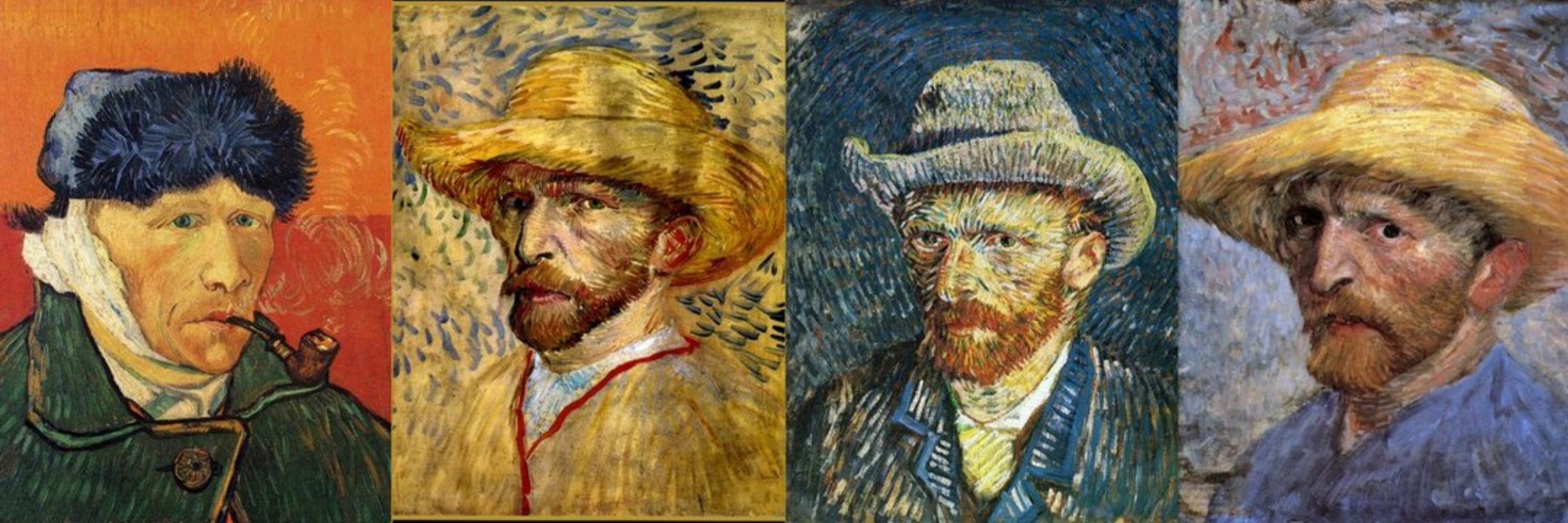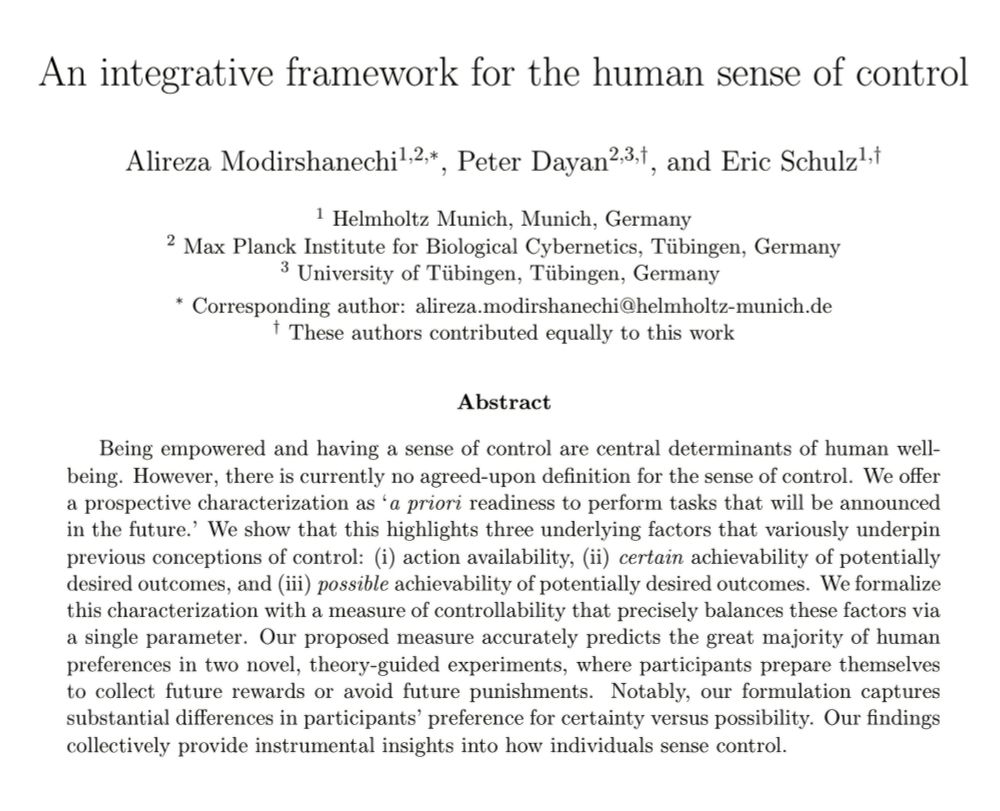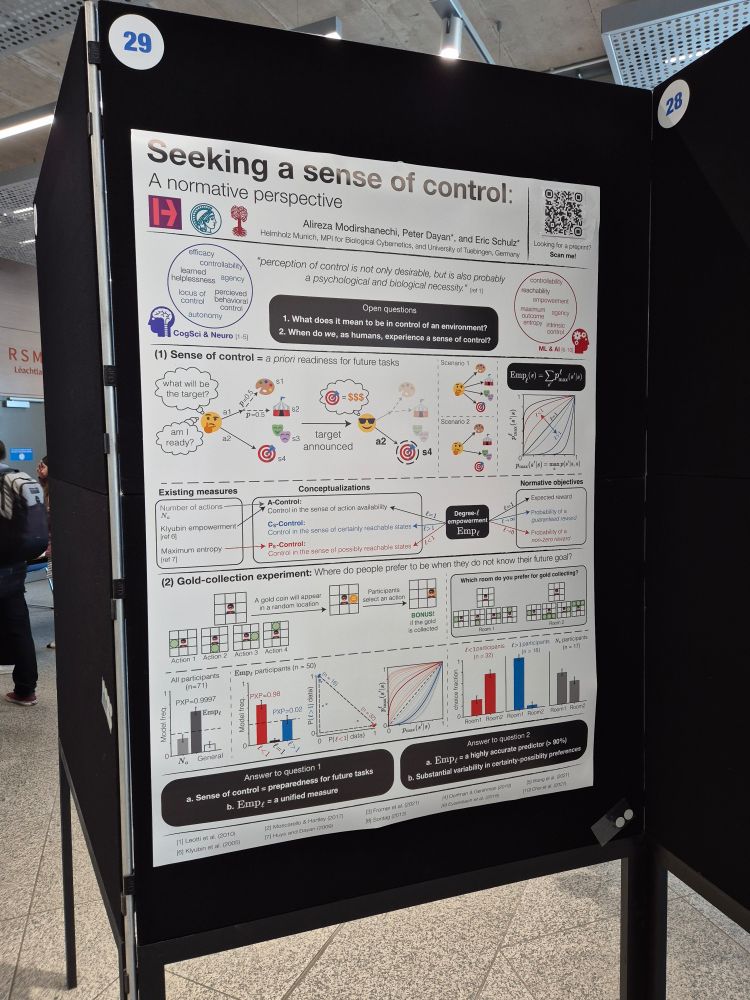
Alireza Modirshanechi
@modirshanechi.bsky.social
Postdoc at Helmholtz Munich (Schulz lab) and MPI for Biological Cybernetics (Dayan lab) || Ph.D. from EPFL (Gerstner lab) || Working on computational models of learning and decision-making in the brain; https://sites.google.com/view/modirsha
New in @pnas.org: doi.org/10.1073/pnas...
We study how humans explore a 61-state environment with a stochastic region that mimics a “noisy-TV.”
Results: Participants keep exploring the stochastic part even when it’s unhelpful, and novelty-seeking best explains this behavior.
#cogsci #neuroskyence
We study how humans explore a 61-state environment with a stochastic region that mimics a “noisy-TV.”
Results: Participants keep exploring the stochastic part even when it’s unhelpful, and novelty-seeking best explains this behavior.
#cogsci #neuroskyence


September 28, 2025 at 11:07 AM
New in @pnas.org: doi.org/10.1073/pnas...
We study how humans explore a 61-state environment with a stochastic region that mimics a “noisy-TV.”
Results: Participants keep exploring the stochastic part even when it’s unhelpful, and novelty-seeking best explains this behavior.
#cogsci #neuroskyence
We study how humans explore a 61-state environment with a stochastic region that mimics a “noisy-TV.”
Results: Participants keep exploring the stochastic part even when it’s unhelpful, and novelty-seeking best explains this behavior.
#cogsci #neuroskyence
And if you're not at CCN, you can check out our preprint here (tweeprint coming soon!):
osf.io/preprints/ps...
Looking forward to your thoughts and comments! ☺️
osf.io/preprints/ps...
Looking forward to your thoughts and comments! ☺️


August 13, 2025 at 8:40 AM
And if you're not at CCN, you can check out our preprint here (tweeprint coming soon!):
osf.io/preprints/ps...
Looking forward to your thoughts and comments! ☺️
osf.io/preprints/ps...
Looking forward to your thoughts and comments! ☺️
Attending #CCN2025?
Come by our poster in the afternoon (4th floor, Poster 72) to talk about the sense of control, empowerment, and agency. 🧠🤖
We propose a unifying formulation of the sense of control and use it to empirically characterize the human subjective sense of control.
🧑🔬🧪🔬
Come by our poster in the afternoon (4th floor, Poster 72) to talk about the sense of control, empowerment, and agency. 🧠🤖
We propose a unifying formulation of the sense of control and use it to empirically characterize the human subjective sense of control.
🧑🔬🧪🔬


August 13, 2025 at 8:40 AM
Attending #CCN2025?
Come by our poster in the afternoon (4th floor, Poster 72) to talk about the sense of control, empowerment, and agency. 🧠🤖
We propose a unifying formulation of the sense of control and use it to empirically characterize the human subjective sense of control.
🧑🔬🧪🔬
Come by our poster in the afternoon (4th floor, Poster 72) to talk about the sense of control, empowerment, and agency. 🧠🤖
We propose a unifying formulation of the sense of control and use it to empirically characterize the human subjective sense of control.
🧑🔬🧪🔬
And if you're not RLDM, you can check out our preprint here (tweeprint coming soon!):
osf.io/preprints/ps...
Looking forward to your thoughts and comments! ☺️
osf.io/preprints/ps...
Looking forward to your thoughts and comments! ☺️

June 11, 2025 at 11:16 AM
And if you're not RLDM, you can check out our preprint here (tweeprint coming soon!):
osf.io/preprints/ps...
Looking forward to your thoughts and comments! ☺️
osf.io/preprints/ps...
Looking forward to your thoughts and comments! ☺️
Attending #RLDM2025?
Come by our poster in the evening to talk about the sense of control, empowerment, and agency. 🧠🤖
We propose a unifying formulation of the sense of control and use it to empirically characterize the human subjective sense of control.
🧑🔬🧪🔬
Come by our poster in the evening to talk about the sense of control, empowerment, and agency. 🧠🤖
We propose a unifying formulation of the sense of control and use it to empirically characterize the human subjective sense of control.
🧑🔬🧪🔬

June 11, 2025 at 11:16 AM
Attending #RLDM2025?
Come by our poster in the evening to talk about the sense of control, empowerment, and agency. 🧠🤖
We propose a unifying formulation of the sense of control and use it to empirically characterize the human subjective sense of control.
🧑🔬🧪🔬
Come by our poster in the evening to talk about the sense of control, empowerment, and agency. 🧠🤖
We propose a unifying formulation of the sense of control and use it to empirically characterize the human subjective sense of control.
🧑🔬🧪🔬
I'm thrilled to share that I was recently awarded the EPFL Dimitris N. Chorafas Foundation Award for my Ph.D. thesis, "Seeking the new, learning from the unexpected: Computational models of #surprise and #novelty in the #brain." 🧠🧑🔬🧪
Award news: actu.epfl.ch/news/dimitri...
Award news: actu.epfl.ch/news/dimitri...


December 11, 2024 at 11:26 AM
I'm thrilled to share that I was recently awarded the EPFL Dimitris N. Chorafas Foundation Award for my Ph.D. thesis, "Seeking the new, learning from the unexpected: Computational models of #surprise and #novelty in the #brain." 🧠🧑🔬🧪
Award news: actu.epfl.ch/news/dimitri...
Award news: actu.epfl.ch/news/dimitri...
Yet, we found that combining novelty & information gain nearly always performs best! This aligns with recent experimental results in the neurosciences, suggesting that *novelty* and *information gain* are two principal axes of curiosity-driven behavior!
6/7
6/7

November 18, 2024 at 2:03 PM
Yet, we found that combining novelty & information gain nearly always performs best! This aligns with recent experimental results in the neurosciences, suggesting that *novelty* and *information gain* are two principal axes of curiosity-driven behavior!
6/7
6/7
We developed an algorithm to systematically generate diverse, realistic environments, in which we tested 6 intrinsic rewards against different performance measures.
*Key result?*
The "best reward" depends on the environment class & performance measure = no universal winner!
5/7
*Key result?*
The "best reward" depends on the environment class & performance measure = no universal winner!
5/7


November 18, 2024 at 2:03 PM
We developed an algorithm to systematically generate diverse, realistic environments, in which we tested 6 intrinsic rewards against different performance measures.
*Key result?*
The "best reward" depends on the environment class & performance measure = no universal winner!
5/7
*Key result?*
The "best reward" depends on the environment class & performance measure = no universal winner!
5/7
Hence, identifying the merits of curiosity involves three main elements:
1. Intrinsic rewards (drives of curiosity)
2. Exploration performance (objectives of curiosity)
3. Environment structures
*Our goal?*
To demystify the interaction between these elements!
4/7
1. Intrinsic rewards (drives of curiosity)
2. Exploration performance (objectives of curiosity)
3. Environment structures
*Our goal?*
To demystify the interaction between these elements!
4/7

November 18, 2024 at 2:03 PM
Hence, identifying the merits of curiosity involves three main elements:
1. Intrinsic rewards (drives of curiosity)
2. Exploration performance (objectives of curiosity)
3. Environment structures
*Our goal?*
To demystify the interaction between these elements!
4/7
1. Intrinsic rewards (drives of curiosity)
2. Exploration performance (objectives of curiosity)
3. Environment structures
*Our goal?*
To demystify the interaction between these elements!
4/7
The brain predicts its future observations, but the computational underpinning of this predictive processing is debated. 🤔
In our workshop in #Cosyne2024 (Monday), we'll discuss the links between different computational models and experimental paradigms on the predictive brain!
In our workshop in #Cosyne2024 (Monday), we'll discuss the links between different computational models and experimental paradigms on the predictive brain!

February 28, 2024 at 7:51 PM
The brain predicts its future observations, but the computational underpinning of this predictive processing is debated. 🤔
In our workshop in #Cosyne2024 (Monday), we'll discuss the links between different computational models and experimental paradigms on the predictive brain!
In our workshop in #Cosyne2024 (Monday), we'll discuss the links between different computational models and experimental paradigms on the predictive brain!
... different stages of these behaviors (e.g., from novelty-detection to activation of neuromodulatory systems) and discuss how recent comp. models of curiosity enable integrating different behavioral expressions of curiosity into one theoretical framework. 4/6


November 21, 2023 at 6:05 PM
... different stages of these behaviors (e.g., from novelty-detection to activation of neuromodulatory systems) and discuss how recent comp. models of curiosity enable integrating different behavioral expressions of curiosity into one theoretical framework. 4/6
We start with a classification of different behavioral expressions of curiosity: On one side, we put *reactive orienting* for seeking immediately available information, and, on the other side, we put *active choices* for actions associated with anticipated information. 2/6

November 21, 2023 at 6:04 PM
We start with a classification of different behavioral expressions of curiosity: On one side, we put *reactive orienting* for seeking immediately available information, and, on the other side, we put *active choices* for actions associated with anticipated information. 2/6
What do we talk about when we talk about "curiosity"?
In our new paper in Trends in Neuro. (with K. Kondrakiewicz, W. Gerstner, & S. Haesler), we address this question by reviewing the behavioral signatures, neural mechanisms, and comp. models of curiosity: doi.org/10.1016/j.ti...
In our new paper in Trends in Neuro. (with K. Kondrakiewicz, W. Gerstner, & S. Haesler), we address this question by reviewing the behavioral signatures, neural mechanisms, and comp. models of curiosity: doi.org/10.1016/j.ti...

November 21, 2023 at 6:04 PM
What do we talk about when we talk about "curiosity"?
In our new paper in Trends in Neuro. (with K. Kondrakiewicz, W. Gerstner, & S. Haesler), we address this question by reviewing the behavioral signatures, neural mechanisms, and comp. models of curiosity: doi.org/10.1016/j.ti...
In our new paper in Trends in Neuro. (with K. Kondrakiewicz, W. Gerstner, & S. Haesler), we address this question by reviewing the behavioral signatures, neural mechanisms, and comp. models of curiosity: doi.org/10.1016/j.ti...
This is really fun! 😋

October 27, 2023 at 7:12 AM
This is really fun! 😋

